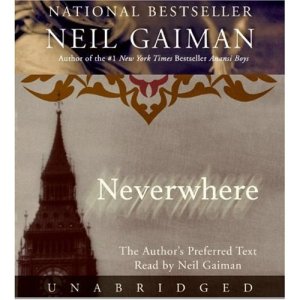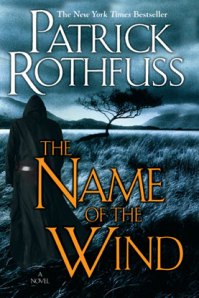Neverwhere
 Neverwhere by Neil Gaiman
Neverwhere by Neil Gaiman
—–
I saw something about Audible on Facebook, namely because it was telling me I could download Neil Gaiman reading Neverwhere. It’s been a long time since I’ve read it — the book was published in 1996, and I’m pretty sure I read it that same year — so it was a good way to refamiliarize myself with the story. It was pretty much like reading the story again, since all I could remember about it was London Beneath. The rest of it? The details? That’s what I didn’t recall. And one thing I didn’t realize until I was listening to the story is that a Neil Gaiman story is good because of the details (well, that and the clever way he has of revealing information to the reader).
I also realized that one of the things that makes people fans of fantasy is the way that people can escape from reality and become heroes in another world. Richard Mayhew, the protagonist, is faced with that same dilemma in Neverwhere, only he’s an unwilling hero. It makes for an interesting dichotomy, though it’s really nothing new in fantasy. It was just enough for me to realize that it was a trope of the urban fantasy genre. Once I realized that, and saw how Gaiman was playing with that convention, the ending took me by surprise.
One of the things I didn’t like about the audiobook is that a lot of the narrative became redundant. If the narrative said, “Richard sighed,” then Gaiman would say that, then sigh when he shifted into Richard Mayhew’s voice. I realized that audiobooks probably work better as a dramatization than a straight read-through.
Other than that, though, it was a real treat listening to Gaiman read his own work. I had the pleasure of seeing him speak at a reading, and I think I still prefer to listen to Coraline than to read it, so it was fun to revisit the book this way. Gaiman develops voices for each of his characters, and manages to maintain them throughout the reading, so it was easy to tell who was speaking, even without the cues from the narrative. So, I got to re-read a book that I wanted to read, and I got Neil himself to read it to me. It’s hard to say that that wasn’t time well spent.
Life
“When you’re twenty-one, life is a roadmap. It’s only when you get to be twenty-five or so that you begin to suspect you’ve been looking at the map upside down, and not until you’re forty are you entirely sure. By the time you’re sixty, take it from me, you’re fucking lost.”
–Devin Jones
(Stephen King, Joyland)
The Name of the Wind
 The Name of the Wind by Patrick Rothfuss
The Name of the Wind by Patrick Rothfuss
—–
It’s about time, I can hear some of you saying. This guy raves about Neil Gaiman, talks a lot about the mythology of story whenever he talks about Fables or The Unwritten, and he still hasn’t managed to read Patrick Rothfuss? Where does he get off?
Well, consider that error corrected. As mentioned previously, I moved him on up my list of books to read based on his review of The Ocean at the End of the Lane, and I don’t regret it. Consider that I managed to make my way through a 722-page novel in about two weeks, while also considering that I’ve been working on Dan Simmons’ 896-page epic Carrion Comfort since last November. The novel moves at a quick pace, and the story flows naturally and compellingly. There’s something almost poetic about parts of the novel, but the rest of it reads like a summer beach-read, with good characters, interesting plot development, and proper antagonists. Rothfuss has given credit to Gaiman as an influence, and while parts of it show here, his style is different enough for him to stand on his own. He’s no imitator, and that’s a great thing.
The story is that of Kvothe, a hero most folks in the novel know through bardic tales. In the novel, Kvothe tells his life’s story to a scribe, starting with his time as a travelling entertainer with his family, his time living on the streets as a beggar, and his time at the University, which he attends to become (basically) a wizard. It’s more complicated than that, with Kvothe running into recurring characters throughout his life, and with weighty revelations occurring during that time. The Name of the Wind is just one-third of Kvothe’s story, covering the first night he tells his tale to the scribe. The novel ends with some of the plot points resolved, but like the Harry Potter series, the overarching story is yet to be told.
Speaking of Harry Potter, readers will find some similarities between the two stories once Kvothe arrives at the University. There are some trials to overcome, with a teacher and student who both despise him to the point of attempting to ruin his life, though at least here Rothfuss gives us concrete reasons why. What works well, though, is that Rothfuss stacks the deck strongly against Kvothe, giving him seemingly insurmountable challenges to overcome. It’s very easy to root for him, even if he sometimes comes across as arrogant, because that unfairness against him makes the reader support him even more. It’s a deft achievement, and one that I’m not sure I’ve ever really realized.
I’m looking forward to the next volume, though I may have to pace myself with it, since the third volume hasn’t been published (or even completed) yet. But considering that the first novel is 722 pages and the second one is 1120 pages, I expect the third one will be 1300 pages long. Given how good the story is so far, and how high my expectations for the future novels are, it’s hard to complain.